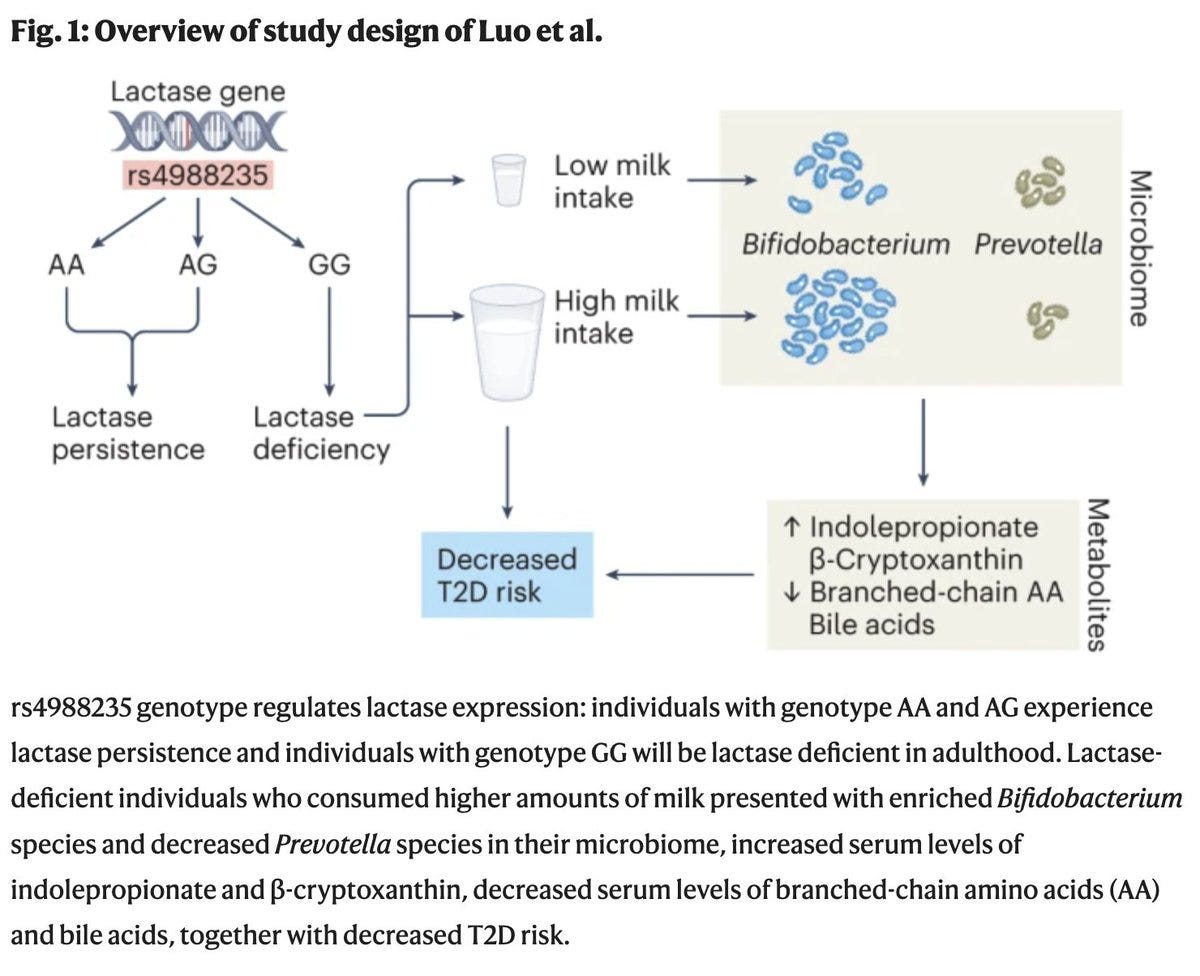Lactase persistence, milk intake and type 2 diabetes risk
Drinking milk while lactase deficient might help grow good gut bacteria that reduce type 2 diabetes risk
A new exciting study in Nature Metabolism by Luo et al. reports that those who lack lactase enzyme as adults (LCT-rs4988235 GG) but consume milk are at lower risk of type 2 diabetes (T2D) and this association is mediated via gut microbiome.
A protective association between milk intake and T2D risk has been observed previously in some human populations like East Asians but not in others like European populations. Here the authors hypothesized that this might be due to genetic confounding by a well-known LCT variant associated with lactase persistence that is prevalent among Europeans but almost absent in East Asians.
The extremely skewed distribution of the lactase persistence variant across human populations makes it challenging to study their interactions with the environment. The authors got past this problem by studying Latin Americans who are admixed for both European and African ancestries and, hence have a balanced distribution of both alleles (60% GG who are lactase non-persistent and 40% AA/AG who are lactase persistent). And importantly, this also avoids confounding by population stratification as the environment remains constant across the genotypes.
First, the authors reproduced the beautiful monogenic-type association between the LCT variant and milk intake in 12,653 Hispanics and they also found the association is weak or absent for milk products such as cheese and Yogurt that are low in lactose.
Then, the authors tested the association of milk intake and LCT variant with T2D risk in ~7k participants who were T2D-free at baseline but a subset (N=768) developed the disease during a 6 yrs follow-up period. They found that milk intake significantly protected against developing T2D, but only in lactase-deficient individuals (GG) and not in lactase-persistent individuals (AA and AG). The authors replicated the same in UK Biobank participants.
Further, the authors dug through the literature and reevaluated the published associations between milk intake and T2D risk and found that the protective association can be found clearly when meta-analyzing only the East Asian studies and the association becomes inverse (but with modest effect size) when meta-analyzing the European studies.
Then, the authors performed a comprehensive analysis of the gut microbiome and blood metabolites in a subset of participants and found that certain microbial species like bifidobacterium and metabolite signature (e.g. high tryptophan and low bile acids) were enriched in lactase non-persistent individuals who consumed milk and associated with reduced T2D risk.
The authors argue that the lactose in the milk consumed by lactase-deficient individuals is available for the gut microbiome which increases certain bacterial species like bifidobacterium (which are used in probiotics) and the metabolism of lactose by these bacteria increases certain good metabolites and decreases certain bad metabolites in the blood, which ultimately influence the T2D risk favourably.
The study overall is very comprehensive with multiple lines of investigations to exclude confounding effects. But still, we should probably wait to see if this sensational story survives the test of time. Meanwhile, let’s enjoy this beautiful piece of research.
Refer to the original article and the accompanying News & Views by Littleton & Grant for further reading.






Umm... The obvious hypothesis here is that shitting your brains out (along with the other symptoms like nausea, fullness, etc) causes malabsorption and reduced "effective" calorie absorption, along with reduced *actual* calorie intake due to chronic nausea and thus decreased risk of DM2.
This is stupid. It's like saying cancer reduces or improves glycemic control in diabetics on a population level. Well, of course it does, but it also tends to kill you.
Useful, but for the fact that it makes those low in lactase shit themselves, no?
Perhaps that's the price we have to pay to avoid type 2 diabetes?